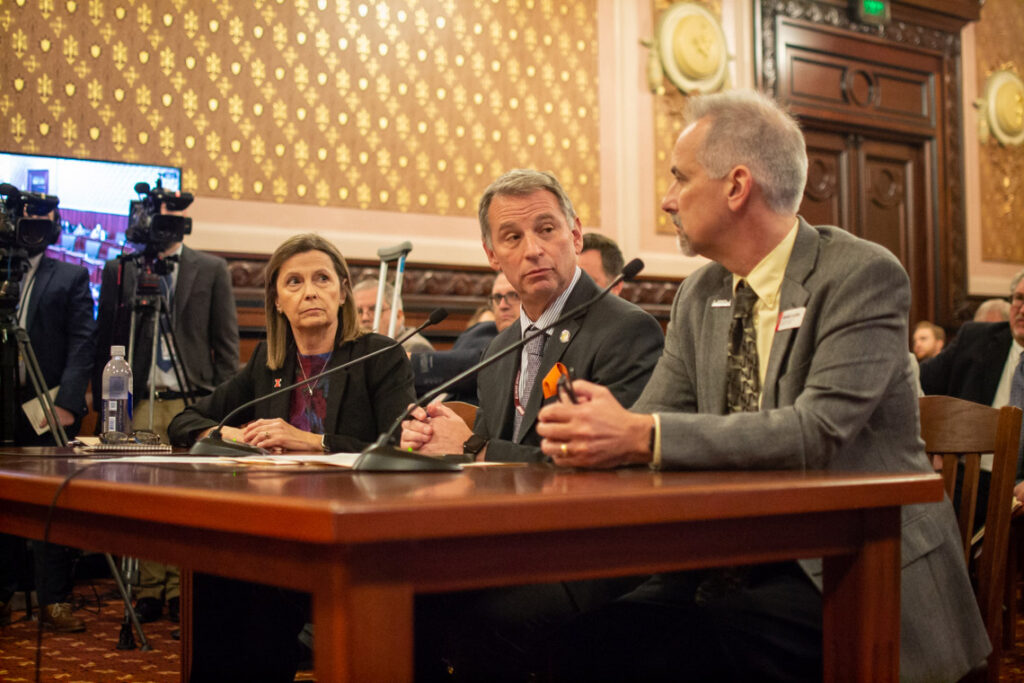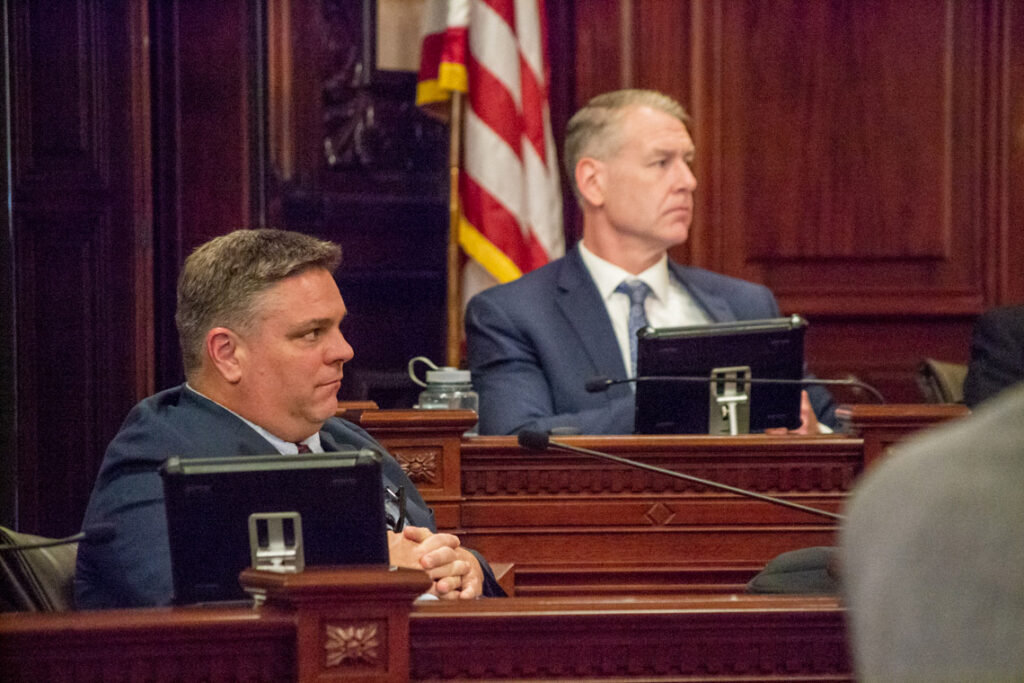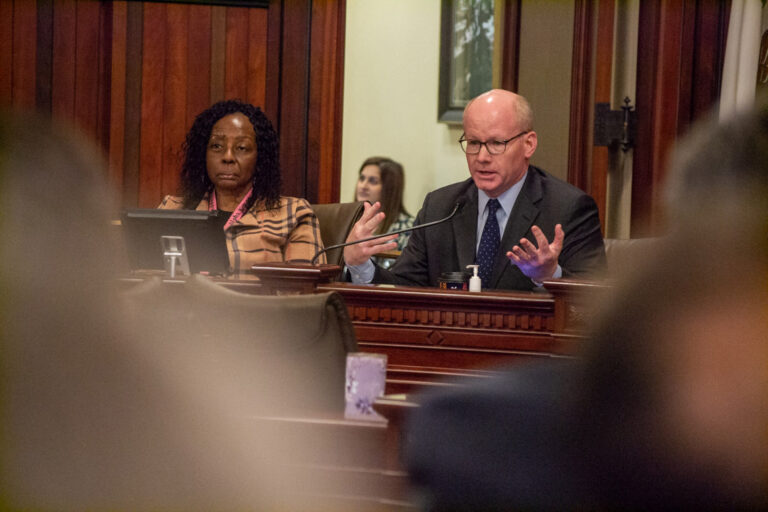Legislation was proposed after a pair of leaks at an ADM injection site near Decatur
An Illinois Senate committee hit pause on a bill to ban carbon sequestration injections near aquifers after more than an hour of debate Wednesday.
Senate President Don Harmon, D-Oak Park, asked that the Senate Executive Committee to wait to act on Senate Bill 3968, which would have banned the practice, until lawmakers can learn more about the carbon injection process and its environmental risks. The bill was proposed after it was revealed that ADM, the Decatur-based agriculture giant, violated federal regulations when liquid carbon dioxide leaked into areas outside the scope of their permit.
The leak was first detected in March and happened about 5,000 feet underground at an injection site that was not in the aquifer’s area. Groundwater in the Mahomet Aquifer sits about 200 feet underground. ADM temporarily paused carbon injections in October after another issue with a well was identified.
The Mahomet Aquifer stretches across central Illinois from the Illinois River to the Indiana state line. The aquifer is federally designated as a “sole source” for hundreds of thousands of residents in Central Illinois, meaning there are no easily available backup sources of drinking water if the aquifer were to become contaminated.

The bill was proposed by two senators served by the aquifer, Sen. Paul Faraci, D-Champaign, with Republican Sen. Chapin Rose, R-Mahomet, lending bipartisan support. Faraci told committee members the drinking water’s protection has been the top concern in his district, while Rose vocally opposed a measure that passed in May to temporarily pause then allow for carbon capture technology in Illinois, in part because it did not contain protections for aquifers.
That law imposed a two-year moratorium on new pipeline construction for transporting captured carbon to storage sites in Illinois while the federal government works out new regulations. Once the two years pass, or the federal government establishes regulations, the Illinois Commerce Commission will then oversee a strict permitting process to approve projects that have already been granted federal permits.
Harmon indicated that two-year ramp gives lawmakers time to further discuss potential protections for aquifers.
“My commitment to you would be that we work with you to make sure that whatever we do, we do to protect the drinking water that the constituents you and Sen. Rose represent, and we get to a good and durable solution to the problem that is based on science,” Harmon said.
Faraci said he understands why Harmon wanted to slow down the process.
“I think this is a complicated issue. There were discussions last May about this. I was not part of those discussions, I’m glad I am now part of those discussions, so I think this is not an overnight kind of fix and there are a lot of parties that are kind of concerned and interested in getting this done right,” Faraci told reporters.
ADM has the nation’s first and only carbon injection project and stores more than 4.5 million tons of carbon dioxide produced from industrial work at ADM’s Decatur plant. Experts have told lawmakers central Illinois’ geology is ideal for the technology because of a rock layer thousands of feet underground.
The issues with ADM’s wells came to light just months after Gov. JB Pritzker signed the bill in July to regulate carbon capture and sequestration in Illinois.
“We all want to protect the Mahomet Aquifer and we want to make sure that carbon sequestration is something that’s good for the state and for the country as a whole,” Pritzker said Wednesday.

Environmental advocates expressed frustration the sequestration law passed even after ADM’s well leaked in March and lawmakers were unaware of it.
“They (ADM) knew about those leaks when folks were here talking about the bill in spring and they didn’t tell legislators about that, or anybody, that that had happened,” said Andrew Rehn from the Prairie Rivers Network.
Rose said during committee he hopes lawmakers decide to act to create a specific protection for the Mahomet Aquifer.
“This well, ADM, which thankfully is not on the Mahomet Aquifer, it’s only been around for less than 10 years and yet we’ve got a problem with it too,” Rose said Wednesday. “So why are we taking any risk at all?”
Faraci acknowledged state law has a rigorous permitting process, but said during committee lawmakers need to ensure the aquifer is protected before that moratorium ends in 2026.
“That would certainly be my hope that there’s no imminent danger. We cannot afford to have a contamination happen to the aquifer,” Faraci told reporters.
The law signed in July represented an agreement between environmental groups and business organizations. Business groups opposed Faraci’s bill, arguing the state and federal governments have already put the necessary permitting protections in place.
“Carbon sequestration is a new concept for a lot of people. New processes can cause uneasiness, new processes can cause fear, and I believe that this bill is more a response to maybe some fear,” said Donovan Griffith from the Illinois Manufacturers’ Association.
It’s unclear when, or if, the bill will move forward, but Faraci told reporters he still hopes to move the bill forward quickly as the current General Assembly winds down business in early January.

